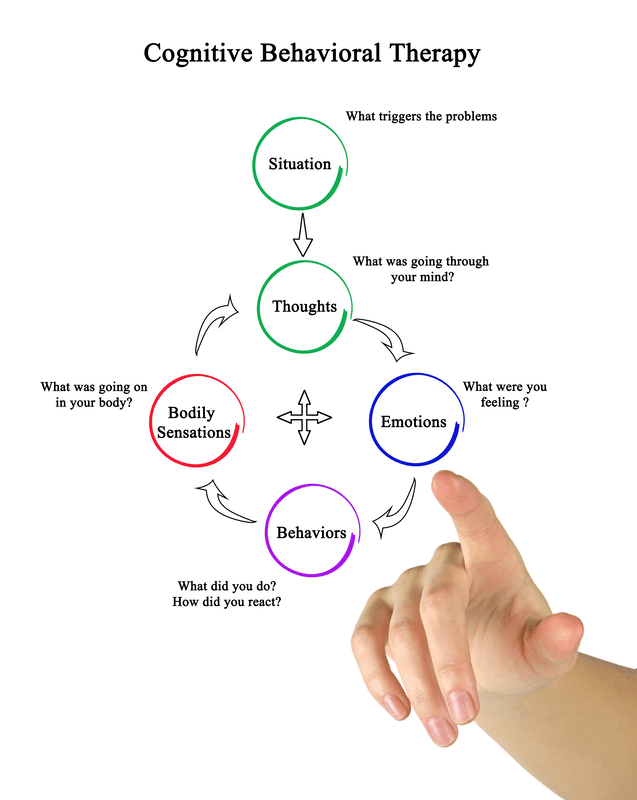Introduction to Cognitive Behavioral Therapy (CBT)

Cognitive behavioral therapy CBT is a scientific evidence-based psychotherapy technique. CBT for mental health disorders, like depression, anxiety, or PTSD), reduces or eliminates distressing mental health symptoms. CBT applied to everyday life challenges, also offers a useful tool for daily coping. A very simple way to explain CBT is to say that if you change how you think about an incident, you will change how you feel about it and behave with emotional maturity.
CBT changes damaging thoughts
Based on the principles of Cognitive Behaviorla Therapy (CBT), we know that how we think about ourselves, situations, and the world we live in impacts our feelings and behaviors.
Aaron T. Beck (1976) identified automatic thoughts that are damaging to a person’s emotional wellbeing. He called them “thinking errors.”
Changing how you think
Good psychological care includes noticing 10 negative automatic thoughts to challenge and refute them.
Negative cognitive behavioural thoughts 1-5:
1. All-or-nothing thinking (also called black-and white, polarized, or dichotomous thinking): You view a situation in only two categories instead of on a continuum. E.g. “If I’m not a total success, I’m a failure.”
2. Catastrophizing (also called fortune-telling): You predict the future negatively without considering other, more likely outcomes. E.g. “I’ll be so upset, I won’t be able to function at all.”
3. Disqualifying or discounting the positive. You unreasonably tell yourself that positive experiences, deeds, or qualities do not count. E.g. “I did that project well, but that doesn’t mean I’m competent; I just got lucky.”
4. Emotional reasoning: You think something must be true because you “feel” (actually believe) it so strongly, ignoring or discounting evidence to the contrary. E.g. “I know I do a lot of things okay at work, but I still feel like I’m a failure.”
5. Labeling: You put a fixed, global label on yourself or others without considering that the evidence might more reasonably lead to a less disastrous conclusion. E.g. “I’m a loser. He’s no good.”
Negative cognitive behavioural thoughts 6-10:
6. Magnification/minimization: When you evaluate yourself, another person, or a situation, you unreasonably magnify the negative and/or minimize the positive. E.g. “Getting a mediocre evaluation proves how inadequate I am. Getting high marks doesn’t mean I am smart.”
7. Mental filter (also called selective abstraction): You pay undue attention to one negative detail instead of seeing the whole picture. E.g. “Because I got one low rating on my evaluation [which also contained several high ratings] it means that I’m doing a lousy job.”
8. Mind reading: You believe you know what others are thinking, failing to consider other, more likely possibilities. E.g. “He thinks that I don’t know the first thing about this project.”
9. Overgeneralization: You make a sweeping negative conclusion that goes far beyond the current situation. E.g. [Because I felt uncomfortable at the meeting] I don’t have what it takes to make friends.”
10. Personalization: You believe others are behaving negatively because of you, without considering more neutral explanations for their behavior. E.g. “The repairman was curt to me because I did something wrong.”
11. “Should” and “must” statements (also called imperatives): You have a precise, fixed idea of how you or others should behave, and you overestimate how bad it is that these expectations are not met. E.g. “It’s terrible that I made a mistake, I should always do my best.”
12. Tunnel vision: You only see the negative aspects of a situation. E.g. ”My son’s teacher can’t do anything right. He’s critical and insensitive and lousy at teaching.” (Cognitive Behavioral Therapy: Basics and Beyond, Judith Beck, 2011)
The role of Cognitive Behavioural Counselors
During counseling sessions damaging automatic thought become evident and they are discussed to make corrections. Over time, clients become quite expert on catching their negative automatic thoughts and make their own corrections. Through this process, self- esteem is repaired, resilience is built and as the negative internal dialogue turns more positive, so that feelings of confidence and a sense of well-being emerges.
Counselors and psychotherapists agree that the following guideline developed by Beck help clients evaluate their thinking:
- Examine the validity of the automatic thought
- Explore the possibility of other interpretations or viewpoints
- Decatastrophize the problematic situation
- Recognize the impact of believing the automatic thought
- Gain distance from the thought
- Take steps to solve the problem
Useful cognitive behavioural questions to ask
According to Beck, these are some useful questions to ask when negative automatic thoughts come, so that a reality based balanced perspective can emerge.
1. What is the evidence that supports this idea?
What is the evidence against this idea?
2. Is there an alternative explanation or viewpoint?
3. What is the worst that could happen (if I’m not already thinking the worst)?
If it happened, how could I cope?
What is the best that could happen?
What is the most realistic outcome?
4. What is the effect of my believing the automatic thought?
What could be the effect of changing my thinking?
5. What would I tell _____________ [a specific friend or family member] if he or she were in the same situation?
6. What should I do?
Behavioural psychotherapy facilitates the process of thinking in a healthy and balanced way. The essence is to speak to yourself kindly, just like you would to a trusted friend who was struggling with a self-doubt, failure, rejection, a mistake, or a break-up.
Cognitive Behavioral Therapy (CBT) changes negative behaviors
People are often feeling triggered in certain situations. Their “uncorrected” automatic thoughts might cause negative behaviors. Perhaps someone shows great anger, behaves aggressively, or abuses substances or food etc. When people change how they think about the trigger situation and make corrections in their thinking, they firstly feel better, and secondly will behave in an emotionally mature way.

Dr. Annette Schonder
Clinical Counsellor,
Marriage Therapist, Hypnotherapist
(American Board)
Call +971 4 457 4240
Sources
Beck Institute: https://beckinstitute.org/cbt-resources/resources-for-professionals-and-students/patient-pamplets/
Citation. Beck, A. T. (1976). Cognitive therapy and the emotional disorders. International Universities Press.
